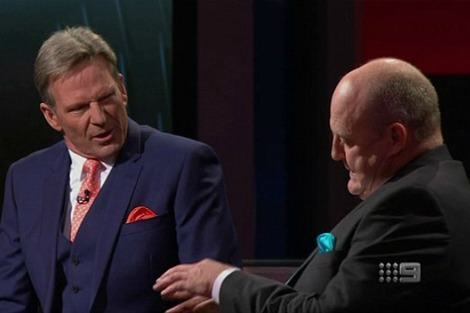Author: Tim Kroenert
There are more than 200 results, only the first 200 are displayed here.
-

ARTS AND CULTURE
- Tim Kroenert
- 24 March 2016
5 Comments
With more than 30 dead in Brussels just a few short months after the horrors in Paris, the Western world again confronts an assailant in ISIS who deals in fear and bloodshed. In contemplating our responses to such attacks we recognise the historical and current geopolitical realities that have bred the ideologies that fuel them. This messiness is the stuff of a new British film that arrives in Australia this week, which explores the plight of those who might be 'collateral damage' in the hyper-technological 'war on terror'.
READ MORE 
-

MEDIA
- Tim Kroenert
- 17 March 2016
7 Comments
It's time someone called out this whole Billy Brownless/Garry Lyon saga for what it is. These former AFL footballers and sports media colleagues have fallen out over the past few months, over a reported affair between Lyon and Brownless' ex-wife, Nicky. This is not merely a salacious non-story. It is the nadir of a grubby grain of sports journalism that serves as the mouthpiece for an industry that has a long way to go before it leaves accusations of racism, homophobia and misogyny in its wake.
READ MORE 
-

ARTS AND CULTURE
- Tim Kroenert
- 10 March 2016
6 Comments
When questioned about diversity in his films recently, Joel Coen replied: 'You don't sit down and say, "I'm going to write a story that involves four black people, three Jews, and a dog".' The answer is disingenuous at best. Filmmakers choose what stories to tell and how; with a few exceptions, the Coens tell stories about white men. Just as Quentin Tarantino ought to continue discussing the role violence and misogyny play in his films, the Coens should engage meaningfully with questions of diversity.
READ MORE 
-

ARTS AND CULTURE
- Tim Kroenert
- 03 March 2016
In the history of the Second World War and the deathly screed of the Final Solution, the Sonderkommando cuts a pitiable figure. These Jewish prisoners at Auschwitz and other death camps who were forced to perform the logistics surrounding mass murder - the carting and disposal of dead flesh - though patently victims, were viewed by some as collaborators. Son of Saul provides an immersive and impressionistic extrapolation of this ethical and actual horror.
READ MORE 
-

ARTS AND CULTURE
- Tim Kroenert
- 25 February 2016
As Kate plans a party for their 45th wedding anniversary, news arrives that the body of Katya, Geoff's long-dead first love, has been discovered in a Swiss glacier. The 'life-lie' that emerges turns out to be not so much a concealment but rather a minimisation of truth. The disruption it causes to an ostensibly happy marriage comes not in the form of shocking revelation, but slow-dawning realisation; not that Geoff isn't the man he purported to be, but that Kate may not be what she believed herself to be, to him.
READ MORE 
-

ARTS AND CULTURE
- Tim Kroenert
- 18 February 2016
1 Comment
Eilis' profound homesickness is evoked by the letters she composes for and receives from her long distant sister and mother. Her sense of awe at this new world is revealed in her interactions with the other, more brazen boarders; and at work, where she is chided by her manager for being too shy with customers. Gradually, familiarity and opportunity allow her to grow in confidence. Her coming-of-age is defined as gradual self-empowerment through the making of small, and sometimes large, choices.
READ MORE 
-

ARTS AND CULTURE
- Tim Kroenert
- 11 February 2016
As screenwriter for comic such oddities as Being John Malkovich and Adaptation, Kaufman delineated a particular type of over-educated, middle-class, white male character. His protagonists are artists whose alienation and self-loathing is at odds with their social privilege, and whose creative drive entails a winnowing for authenticity or immortality that leads them inexorably down the rabbit hole of their own navels: the search for meaning as the ultimate act of self-absorption.
READ MORE 
-

ARTS AND CULTURE
- Tim Kroenert
- 04 February 2016
11 Comments
As a white, middle-class, straight, cisgendered man, I am conscious of the extent to which the chips of social privilege have been stacked in my favour. As such there are some public conversations that I am patently unqualified to enter. One of these is the sometimes fierce debate that exists between some feminists and some members or supporters of the transgender community. One of the pitfalls of telling a story about marginalisation from a perspective of privilege is that you can overlook ethical nuances.
READ MORE 
-

ARTS AND CULTURE
- Tim Kroenert
- 01 February 2016
For seven years, Joy has been held prisoner in the garden shed of a suburban maniac. During this time she has raised a son, Jack, who is now five, employing elaborate and imaginative methods to nurture and educate him, while protecting him from the reality of their existence. Room is remarkable for its capacity to transmit the bleakness of Joy's situation via the wonder-full gaze of Jack, for whom this makeshift prison is the entire world, bursting with possibilities for recreation, rest and learning.
READ MORE 
-

ARTS AND CULTURE
- Tim Kroenert
- 21 January 2016
2 Comments
It's less than a year since we lamented the lack of non-white faces among 2015's Oscar nominees. This year the situation is even grimmer, with not one non-white face among 20 nominees for acting awards, despite a raft of clear contenders. It is ironic, because at first glance, concepts of empowerment and inclusion seem to have been at the forefront of Academy members' minds. The theme of bringing marginalised or oppressed groups into the centre, or of restoring power and dignity to vulnerable individuals from whom it has been stripped, run through many of this year's nominated films.
READ MORE 
-

ARTS AND CULTURE
- Tim Kroenert
- 14 January 2016
If you're going to apply a blowtorch to an institution as wealthy and litigious as the Church of Scientology, you might best be advised to first apply a magnifying glass. Alex Gibney details the dark side of the movement: its dubious tax-exempt status; allegations of psychological and physical abuse of current members and harassment of former members. But he is equally interested in unpacking the nature of belief in Scientology: what draws people to it, and also what drives them away.
READ MORE 
-

ARTS AND CULTURE
- Tim Kroenert
- 17 December 2015
2 Comments
From the drama-filled mind of a pre-teen girl to the homes of former Indonesian death-squad members; from a day in the life of a transgender sex-worker to a grim and sublime new rendition of one of Shakespeare's most famous plays; from one actor's immense ego to another's fading relevance to an allegedly doomed writer's captivating self-effacement, Eureka Street's resident film buff Tim Kroenert revisits the characters and themes of some of the best and most conversation-worthy films of 2015.
READ MORE 